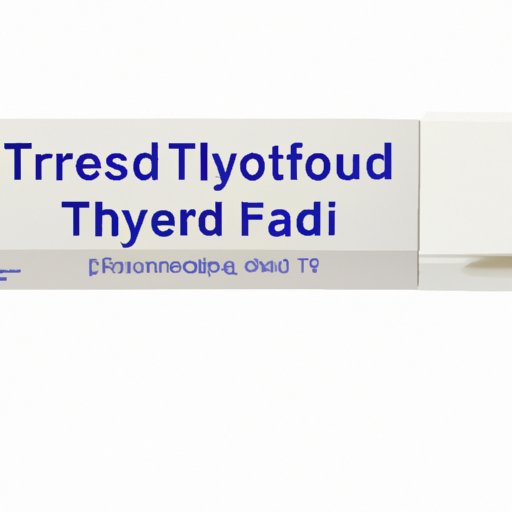
Demystifying the Free T4 Blood Test: Everything You Need to Know
If you’ve visited a healthcare provider for a routine check-up or presented symptoms related to thyroid disorders, chances are you’ve undergone one or more blood tests, including a Free T4 test. This blood test is one of the methods used to evaluate thyroid function, and it is crucial in assessing the potential causes of thyroid-related disorders. In this article, we’ll explore the Free T4 blood test, why it is important to understand it, and what it entails.
The Complete Guide to Understanding Free T4 Blood Test
A Free T4 blood test is a medical procedure that measures the level of the “free” thyroxine hormone – thyroxine not bound to proteins- in your blood. It is used to evaluate thyroid function, much like the TSH and T3 thyroid function blood tests. What sets this test apart is that it provides a direct measurement of unbound (free) T4. Impressed? Let’s dig deeper to understand what differentiates the Free T4 blood test from other thyroid function tests.
Why Free T4 Blood Test Is Important for Your Health
The free T4 hormone plays an important role in regulating your body’s metabolism, growth, temperature, and heartbeat. An optimal free T4 level ensures that these body functions operate normally, therefore, keeping you in great physical and mental shape. Low or high levels of free T4 hormone can lead to several health complications caused by underlying thyroid disorders. Thyroid disorders that can result in abnormal free T4 levels include Hypothyroidism, Hyperthyroidism, Grave’s disease, Thyroiditis, among others. Assessing the levels of free T4 hormone is, therefore, a crucial step in diagnosing and treating thyroid disorders, ensuring that you maintain excellent health.

What You Need to Know Before Taking Free T4 Blood Test
As with any blood test, there are specific steps that you should take before taking the Free T4 blood test. First, inform your specialist if you’re taking any medication that might interfere with the results of the test. This is particularly important as some medication, such as birth control pills, hormone therapy, and steroids, can cause a fluctuation in the free T4 levels. Secondly, fast for about 4- 6 hours before the test as nutrients in food can sometimes interfere with the test results. Thirdly, communicate effectively with your healthcare provider if you are diabetic or have any bleeding disorders as these conditions might affect the blood sample collection process.
The Steps Involved in a Free T4 Blood Test
Taking the Free T4 blood test is a simple process that doesn’t require any special preparation, except for the ones highlighted above. Your healthcare provider will begin the test by inserting a needle into the vein and drawing blood into a test tube. The procedure should take no more than 10 minutes, depending on how easily your veins are accessible. In some cases, you may experience mild pain, bruising, or bleeding at the site where the needle was inserted, but the symptoms vanish within a short time of completing the test. Once the blood sample has been collected, it’s transported to a laboratory for analysis.
How to Read Your Free T4 Blood Test Results
The Free T4 blood test results are measured in nanograms per deciliter (ng/dL). The normal range for free T4 is usually between 0.7 and 1.9ng/dL. If your test results show that you have free T4 levels above or below the normal range, it could indicate a thyroid-related disorder, necessitating further evaluation. Your healthcare provider will analyze your results, interpret them, and recommend any next steps or treatments necessary to regulate your thyroid function. Remember that a single lab result doesn’t mean an accurate diagnosis. It’s important to work with your healthcare provider, who may also order further testing or an evaluation to determine the root cause of any abnormality.
The Role of Free T4 Blood Test in Diagnosing Thyroid Disorders
As mentioned earlier, the Free T4 blood test is a vital tool in the diagnosis of several thyroid-related disorders. Combined with other thyroid function tests, it provides insight into your overall thyroid health. In case you present symptoms of thyroid-related disorders or have a family history of such conditions, your specialist will order a series of tests, including the Free T4 blood test, to give a clear picture of what’s going on in your body. Common thyroid disorders diagnosed using Free T4 blood test as part of the diagnostics include Hyperthyroidism, Hypothyroidism, Thyroiditis, Thyroid cancer, and others.
What Changes in Free T4 Blood Test Results Mean for Your Health
If you’ve undergone the Free T4 blood test, and the results indicate elevated or decreased levels of free T4, it could mean a host of things. Elevated levels of free T4 could indicate an overactive thyroid gland (Hyperthyroidism), while decreased levels could be a sign of an underactive thyroid gland (Hypothyroidism). Other reasons why your T4 levels may be compromised include liver disease, pregnancy, and pituitary gland malfunctions. It’s essential to monitor your free T4 levels over time as significant changes in the test results could indicate a problem with your thyroid gland that needs to be addressed. If you are concerned about the changes in your test results, seek medical attention to get to the root cause and find the best treatment for your condition.
Conclusion
The Free T4 blood test is an essential tool in assessing thyroid function and diagnosing related disorders. It’s essential to understand what the test entails, how to prepare for it, and what the results mean for your health. When combined with other thyroid function tests, the test provides invaluable information to healthcare providers in diagnosing and treating thyroid disorders, helping you maintain excellent health. Remember to seek medical attention if you have any concerns about your thyroid health, as early diagnosis, and prompt treatment are essential in preventing complications.


